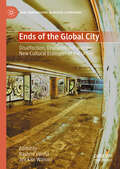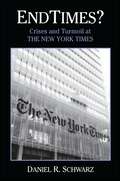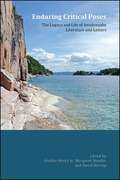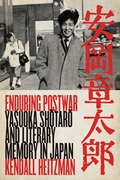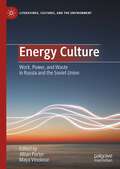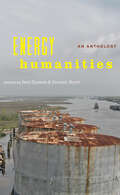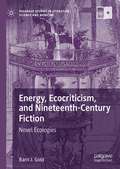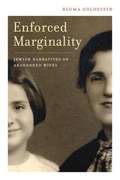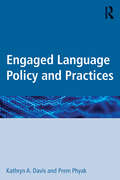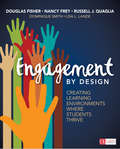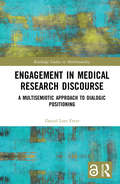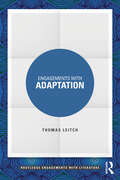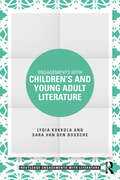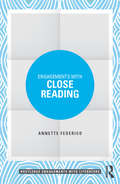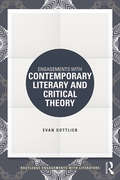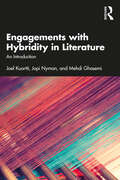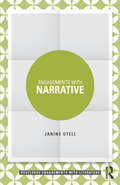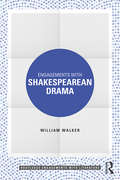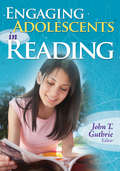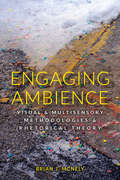- Table View
- List View
Ends of the Global City: Disaffection, Displacement and the New Cultural Ecologies of the Urban (New Comparisons in World Literature)
by Jini Kim Watson Rashmi VarmaThis volume of essays explores how the global city is confronting new forms of crises and disruption. Examining cities in the Caribbean, North America, Africa, the Persian Gulf, Asia and Australia, the essays use literary and cultural analysis to examine the pasts, present and futures of the global city. Ranging from the period of high postcolonial development, industrialization and compacted modernization to present-day neoliberal urban planning, the collection considers arrivals and departures in the global city, offering new critical vocabularies to analyse ongoing processes of migration, economic immiseration, and environmental collapse.
Endtimes?: Crises and Turmoil at the New York Times (Excelsior Editions)
by Daniel R. SchwarzFrom false stories about weapons of mass destruction in Iraq to growing competition from online and twenty-four-hour cable news, the first decade of the twenty-first century was not particularly kind to the New York Times. In this groundbreaking study of the recent life and times of America's most important newspaper, Daniel R. Schwarz describes the transformation of the Times as it has confronted not only its various scandals and embarrassments but also the rapid rise of the internet and blogosphere, the ensuing decline in circulation and print advertising, and the change in what contemporary readers want and how they want to get it.Drawing on more than forty one-on-one interviews with past and present editors (including every living executive editor), senior figures on the business and financial side, and publisher Arthur Sulzberger Jr., Schwarz discusses virtually every aspect of the contemporary Times, from columnists to cultural coverage. He explains how, in response to continuous online updating and twenty-four-hour all-news radio and television, the Times has become much more like a daily magazine than a traditional newspaper, with increased analysis (as opposed to reporting) of the news as well as value-added features on health, travel, investing, and food.After carefully tracing the rise of the Times's website, Schwarz asks whether the Times can survive as a print newspaper, whether it can find a business model to support its vast print and online newsgathering operation, and whether the Sulzberger family can survive as controlling owners. He also asks whether the Times, in its desperate effort to survive, has abandoned its quality standards by publishing what he calls "Timeslite" and "Timestrash."Writing as a skeptical outsider and devoted lifelong reader, Schwarz concludes that the Times is the worst newspaper in the world—except for all the others. Endtimes? is a must-read for Times readers as well as anyone interested in the radical change in print and broadcast media in the rapidly evolving Internet Age.
Enduring Critical Poses: The Legacy and Life of Anishinaabe Literature and Letters (SUNY series, Native Traces)
by Gordon Henry Jr.; Margaret Noodin; David StirrupEnduring Critical Poses examines the stories, poems, plays, and histories centered in the Great Lakes region of North America, where the Anishinaabeg live in a space Basil Johnston referred to as "Maazikamikwe," a maternal earth. The Anishinaabeg are a confederacy of many communities, including the Odawa, Saulteaux, Ojibwe, Potawatomi, Oji-Cree, and Algonquin peoples, who share cultural practices and related languages. Bringing together senior scholars and new voices on the Anishinaabe intellectual landscape, this volume specifically explores Ojibwe, Odawa, and Potawatomi culture, language, and literary heritage. Through a tribal-centric framework, the contributors connect various branches of Native American literary studies and celebrate Anishinaabe narrative diversity to offer a single, overarching story of Anishinaabe survival and endurance.
Enduring Postwar: Yasuoka Shotaro and Literary Memory in Japan
by Kendall HeitzmanYasuoka Shōtarō (1920–2013) was perfectly situated to become Japan's premier chronicler of the Shōwa period (1926–89). Over fifty years as a writer, Yasuoka produced stories, novels, plays, and essays, as well as monumental histories that connected his own life to those of his ancestors. He was also the only major Japanese writer to live in the American South during the Civil Rights Movement, when he spent most of an academic year at Vanderbilt University in Nashville. In 1977, he translated Alex Haley's Roots into Japanese.For a long period, Yasuoka was at the center of the Japanese literary establishment, serving on prize committees and winning the major literary prizes of the era: the Akutagawa, the Noma, the Yomiuri, and the Kawabata. But what makes Yasuoka fascinating as a writer is the way that he consciously, deliberately resisted accepted narratives of modern Japanese history through his approach to personal and collective memory.In Enduring Postwar, the first literary and biographical study of Yasuoka in English, Kendall Heitzman explores the element of memory in Yasuoka's work in the context of his life and evolving understanding of postwar Japan.
Energy Culture: Work, Power, and Waste in Russia and the Soviet Union (Literatures, Cultures, and the Environment)
by Maya Vinokour Jillian PorterThis volume investigates energy as a shaping force in Russian and Soviet literature, visual culture, and social practice. Chronologically arranged chapters explain how nineteenth-century ideas about energy informed realist novels and paintings; how the poetics of energy defined pre-Revolutionary and Stalinist utopianism; and how fossil fuels, electricity, and nuclear fission generated distinct aesthetic features in Imperial Russian, Soviet, and post-Soviet literature, cinema, and landscape. The volume’s concentration on Russia responds to a clear need to understand the role the country plays in social, political, and economic processes endangering life on Earth today. The cultural dimension of Russia’s efforts at energy dominance deserves increased scholarly attention not only in its own right, but also because it directly affects global energy policy. As the contributors to this volume argue, the nationally inflected cultural myths that underlie human engagements with energy have been highly consequential in the Anthropocene.
Energy Humanities: An Anthology
by Imre Szeman and Dominic BoyerHow can humanities scholars help us respond to growing concerns about climate change and fossil fuels?Energy humanities is a field of scholarship that, like medical and digital humanities before it, aims to overcome traditional boundaries between the disciplines and between academic and applied research. Responding to growing public concern about anthropogenic climate change and the unsustainability of the fuels we use to power our modern society, energy humanists highlight the essential contribution that humanistic insights and methods can make to areas of analysis once thought best left to the natural sciences.In this groundbreaking anthology, Imre Szeman and Dominic Boyer have brought together a carefully curated selection of the best and most influential work in energy humanities. Arguing that today’s energy and environmental dilemmas are fundamentally problems of ethics, habits, imagination, values, institutions, belief, and power—all traditional areas of expertise of the humanities and humanistic social sciences—the essays and other pieces featured here demonstrate the scale and complexity of the issues the world faces. Their authors offer compelling possibilities for finding our way beyond our current energy dependencies toward a sustainable future.Contributors include: Margaret Atwood, Paolo Bacigalupi, Lesley Battler, Ursula Biemann, Dominic Boyer, Italo Calvino, Warren Cariou, Dipesh Chakrabarty, Una Chaudhuri, Claire Colebrook, Stephen Collis, Erik M. Conway, Amy De’Ath, Adam Dickinson, Fritz Ertl, Pope Francis, Amitav Ghosh, Gökçe Günel, Gabrielle Hecht, Cymene Howe, Dale Jamieson, Julia Kasdorf, Oliver Kellhammer, Stephanie LeMenager, Barry Lord, Graeme Macdonald, Joseph Masco, John McGrath, Martin McQuillan, Timothy Mitchell, Timothy Morton, Jean-François Mouhot, Abdul Rahman Munif, Judy Natal, Reza Negarestani, Pablo Neruda, David Nye, Naomi Oreskes, Andrew Pendakis, Karen Pinkus, Ken Saro-Wiwa, Hermann Scheer, Roy Scranton, Allan Stoekl, Imre Szeman, Laura Watts, Michael Watts, Jennifer Wenzel, Sheena Wilson, Patricia Yaeger, and Marina Zurkow
Energy in the Atmosphere (Inspire Science, Grade 6 Integrated #Unit 3)
by Douglas Fisher Ralph M. Feather Alton L. BiggsNIMAC-sourced textbook
Energy, Ecocriticism, and Nineteenth-Century Fiction: Novel Ecologies (Palgrave Studies in Literature, Science and Medicine)
by Barri J. GoldEnergy, Ecocriticism, and Nineteenth-Century Fiction: Novel Ecologies draws on energy concepts to revisit some of our favorite books—Mansfield Park, Jane Eyre, Great Expectations, and The War of the Worlds—and the ways these shape our sense of ourselves as ecological beings. Barri J. Gold regards the laws of thermodynamics not solely as a set of physical principles, but also as a cultural and conceptual form that we can use to reimagine our historically vexed relationship to the natural world. Beginning with an examination of the parallel inceptions of energy and ecology in the mid-nineteenth century, this book considers the question of how we may better read and interpret our world, developing a recipe for experimental reading and insisting upon the importance of literary studies in a world driving to ecological catastrophe.
Enforced Marginality: Jewish Narratives on Abandoned Wives
by Bluma GoldsteinThis illuminating study explores a central but neglected aspect of modern Jewish history: the problem of abandoned Jewish wives, oragunes ("chained wives")--women who under Jewish law could not obtain a divorce--and of the men who deserted them. From seventeenth- and eighteenth-century Germany to late nineteenth-century eastern Europe and twentieth-century United States, Enforced Marginality explores representations of abandoned wives while tracing the demographic movements of Jews in the West. Bluma Goldstein analyzes a range of texts (in Old Yiddish, German, Yiddish, and English) at the intersection of disciplines (history, literature, sociology, and gender studies) to describe the dynamics of power between men and women within traditional communities and to elucidate the full spectrum of experiences abandoned women faced.
Engaged Journalism
by Jake BatsellExplores the changing relationship between news producers and audiences and the methods journalists can use to secure the attention of news consumers.
Engaged Journalism: Connecting with Digitally Empowered News Audiences
by Jake BatsellExplores the changing relationship between news producers and audiences and the methods journalists can use to secure the attention of news consumers.
Engaged Journalism: Connecting with Digitally Empowered News Audiences (Columbia Journalism Review Books)
by Jake BatsellEngaged Journalism explores the changing relationship between news producers and audiences and the methods journalists can use to secure the attention of news consumers. Based on Jake Batsell's extensive experience and interaction with more than twenty innovative newsrooms, this book shows that, even as news organizations are losing their agenda-setting power, journalists can still thrive by connecting with audiences through online technology and personal interaction.Batsell conducts interviews with and observes more than two dozen traditional and startup newsrooms across the United States and the United Kingdom. Traveling to Seattle, London, New York City, and Kalamazoo, Michigan, among other locales, he attends newsroom meetings, combs through internal documents, and talks with loyal readers and online users to document the successes and failures of the industry's experiments with paywalls, subscriptions, nonprofit news, live events, and digital tools including social media, data-driven interactives, news games, and comment forums. He ultimately concludes that, for news providers to survive, they must constantly listen to, interact with, and fulfill the specific needs of their audiences, whose attention can no longer be taken for granted. Toward that end, Batsell proposes a set of best practices based on effective, sustainable journalistic engagement.
Engaged Language Policy and Practices
by Kathryn A. Davis Prem PhyakEngaged Language Policy and Practices re-envisions language policy and planning as an engaged approach, drawing on and portraying theoretical and educational equity perspectives. It calls for the right to language policy-making in which all concerned—communities, parents, students, educators, and advocates—collectively imagine new strategies for resisting global neoliberal marginalization of home languages and cultural identities. This book subsequently emphasizes the means by which engaged dialectic processes can inform and clarify language policy-making decisions that promote equity. In other words, rather than descriptions of outcomes, the authors emphasize the need to detail the means by which local/regional actors resist and transform inequitable policies. These descriptions of processes thereby provide all actors with ideological, pedagogical, and equity policy tools that can inform situated school and community policy-making. This book depicts ways in which engaged language policy embodies the intersection of critical inquiry, participant involvement, and ongoing engaged language planning processes. It further offers an alternative to the traditional top-down approach to language education policy-making. Engaged Language Policy and Practices is essential reading for scholars, teachers, students, communities, and others concerned with worldwide language and identity equity.
Engagement by Design: Creating Learning Environments Where Students Thrive (Corwin Literacy)
by Douglas Fisher Dr Nancy Frey Dr Russell J. Quaglia Dr Lisa L. Lande Dominique SmithEngaging Students for Success Through Purposeful Design Every teacher wants engaged students. No student wants to be bored. So why isn’t every classroom teeming with discussion and activity centered on the day’s learning expectations? Engagement by Design gives you a framework for making daily improvements in engaging your students, highlighting opportunities that offer the greatest benefit in the least amount of time. You’ll learn how focusing on relationships, clarity, and challenge can make all the difference in forging a real connection with students. Engagement by Design puts you in control of managing your classroom’s success and increasing student learning, one motivated student at a time.
Engagement by Design: Creating Learning Environments Where Students Thrive (Corwin Literacy)
by Douglas Fisher Dr Nancy Frey Dr Russell J. Quaglia Dr Lisa L. Lande Dominique SmithEngaging Students for Success Through Purposeful Design Every teacher wants engaged students. No student wants to be bored. So why isn’t every classroom teeming with discussion and activity centered on the day’s learning expectations? Engagement by Design gives you a framework for making daily improvements in engaging your students, highlighting opportunities that offer the greatest benefit in the least amount of time. You’ll learn how focusing on relationships, clarity, and challenge can make all the difference in forging a real connection with students. Engagement by Design puts you in control of managing your classroom’s success and increasing student learning, one motivated student at a time.
Engagement in Medical Research Discourse: A Multisemiotic Approach to Dialogic Positioning (Routledge Studies in Multimodality)
by Daniel Lees FryerThis book integrates insights from dialogic theory and systemic functional linguistics (SFL) to extend our understandings of engagement in medical research articles, going beyond notions of the role of verbal dialogue to encompass mathematical and visual semiotics and consider text not just as language but as multisemiosis. The volume begins by outlining the engagement framework and offering a brief overview of historical developments in medical research discourse. This discussion culminates in the introduction of the corpus used for analysis, drawing on original research articles from key medical journals to explore verbal, mathematical, and visual engagement in turn. A subsequent chapter brings these perspectives together to demonstrate intersemiotic engagement across different stages and phases of the medical research article and how such resources work together to construe and maintain the authoritative position commonly associated with medical discourse. The book looks ahead to engagement in other related disciplinary fields and future directions for work on multisemiosis and medical research discourse more generally. This book will be of particular interest to graduate students and researchers in multimodality, critical discourse analysis, applied linguistics, SFL, and science education.
Engagements with Adaptation (Routledge Engagements with Literature)
by Thomas LeitchEngagements with Adaptation invites students both to consider adaptations on their own terms and to engage with the urgent questions they raise about literary canons; the media industry; the relations between different kinds of media; the nature of national, political, and cultural identities; and the ways in which contemporary digital and social media have complicated the roles of producers and consumers of texts.Thomas Leitch guides students through six ways of thinking about adaptation: aesthetic, intertextual, industrial, biological, sociological, and participatory. He explores multiple media and discusses a wide range of sources, including Frankenstein, Persepolis, Bridgerton, and the world of DC and Marvel comics. Each of the six chapters includes a detailed discussion of Greta Gerwig’s film Barbie to help readers compare the ways in which these six approaches can engage with a single text. The book also offers invaluable insight into copyright, censorship, critical race theory, and immigration. The questions at the end of each section embed and reinforce learning and prompt further research.This accessible and engaging guide reveals how the “anti- discipline” of adaptation studies is adjacent to a remarkable array of disciplines, making it a much-needed resource for students interested in television studies, moving image studies, digital media studies, translation studies, performance studies, music and art history and creation, border studies, race studies, queer studies, disability studies, and ecocritical studies.
Engagements with Children’s and Young Adult Literature (Routledge Engagements with Literature)
by Lydia Kokkola Sara Van den BosscheEngagements with Children’s and Young Adult Literature offers an accessible guide to studying Children’s and Young Adult (CYA) literature, teaching readers how to read critically. This book introduces this dynamic field encompassing diverse genres, audiences, and interpretations. Lydia Kokkola and Sara Van den Bossche examine its historical, cultural, and ideological dimensions while addressing adult perspectives and the ambivalence of child agency. Tools for critical analysis, genre-specific insights, and emerging research trends enhance readers’ engagement with CYA literature and its broader implications.The book approaches CYA literature from various complementary angles: Historical: the influence of religious and philosophical convictions on its development; Thematic: commonly-occurring genres and types of CYA literature, such as realism versus speculative fiction; Narratological: plot, time, tension, character, and setting; Visual: the main principles for 'reading' images in picturebooks, graphic novels, and comics; Ideological: power dynamics and common constructions of childhood; Social: questions of identity politics related to race, gender, and orientation, and offers tools to read critically. Engagements with Children’s and Young Adult Literature brings together established theories and new perspectives on CYA literature, combining engagement with theory with hands-on analytical, interpretive, and methodological tools for budding scholars of CYA literature. Exploring a diverse range of writing, this dynamic introduction is an invaluable resource for students and scholars of this vibrant field.
Engagements with Close Reading (Routledge Engagements with Literature)
by Annette FedericoWhat should we do with a literary work? Is it best to become immersed in a novel or poem, or is our job to objectively dissect it? Should we consult literature as a source of knowledge or wisdom, or keenly interrogate its designs upon us? Do we excavate the text as an historical artifact, or surrender to its aesthetic qualities? Balancing foundational topics with new developments, Engagements with Close Reading offers an accessible introduction to how prominent critics have approached the task of literary reading. This book will help students learn different methods for close reading perform a close analysis of an unfamiliar text articulate meaningful responses Beginning with the New Critics and recent argument for a return to formalism, the book tracks the reactions of reader-response critics and phenomenologists, and concludes with ethical criticism’s claim for the value of literary reading to our moral lives. Rich in literary examples, most reprinted in full, each chapter models practical ways for students to debate the pros and cons of objective and subjective criticism. In the final chapter, five distinguished critics shed light on the pleasures and difficulties of close reading in their engagements with poetry and fiction. In the wake of cultural studies and historicism, Engagements with Close Reading encourages us to bring our eyes back to the words on the page, inviting students and instructors to puzzle out the motives, high stakes, limitations, and rewards of the literary encounter under the pressure of this beleaguered and persistent methodology.
Engagements with Contemporary Literary and Critical Theory (Routledge Engagements with Literature)
by Evan GottliebEngagements with Contemporary Literary and Critical Theory is a wide-ranging but accessible introduction to the key thinkers and theories integral to the study of literature. Organized thematically, the book provides historical introductions and uses a variety of relevant contemporary examples to illuminate the field. Evan Gottlieb contextualizes the latest developments with regard to forms; discourses; subjectivities and embodiments; media, networks, and machines; and animals, affects, objects, and environments. Each chapter elucidates its concepts through in-depth discussions of major contemporary theorists, including Giorgio Agamben, Sara Ahmed, and Catherine Malabou, and uses engaging examples from a canonical novel, a contemporary text, and a new-media artifact to demonstrate theoretical applications. Additional text boxes regularly introduce emerging or overlooked theorists of interest, including Fred Moten and Sianne Ngai. An ideal guide for students of literary and critical theory, this book will give readers the background they need to continue their own explorations of this vibrant field of study.
Engagements with Hybridity in Literature: An Introduction
by Jopi Nyman Joel Kuortti Mehdi GhasemiEngagements with Hybridity in Literature: An Introduction is a textbook especially for undergraduate and graduate students of literature. It discusses the different dimensions of the notion of hybridity in theory and practice, introducing the use and relevance of the concept in literary studies. As a structured and up-to-date source for both instructors and learners, it provides a fascinating selection of materials and approaches. The book examines the concept of hybridity, offers a historical overview of the term and its critique, and draws upon the key ideas, trends, and voices in the field. It critically engages with the theoretical, intellectual, and literary discussions of the concept from the time of colonialism to the postmodern era and beyond. The book enables students to develop critical thinking through engaging them in case studies addressing a diverse selection of literary texts from various genres and cultures that open up new perspectives and opportunities for analysis. Each chapter offers a specific theoretical background and close readings of hybridity in literary texts. To improve the students’ analytical skills and knowledge of hybridity, each chapter includes relevant tasks, questions, and additional reference materials.
Engagements with Narrative (Routledge Engagements with Literature)
by Janine UtellBalancing key foundational topics with new developments and trends, Engagements with Narrative offers an accessible introduction to narratology. As new narrative forms and media emerge, the study of narrative and the ways people communicate through imagination, empathy, and storytelling is especially relevant for students of literature today. Janine Utell presents the foundational texts, key concepts, and big ideas that form narrative theory and practical criticism, engaging readers in the study of stories by telling the story of a field and its development. Distinct features designed to initiate dialogue and debate include: Coverage of philosophical and historical contexts surrounding the study of narrative An introduction to essential thinkers along with the tools to both use and interrogate their work A survey of the most up-to-date currents, including mind theory and postmodern ethics, to stimulate conversations about how we read fiction, life writing, film, and digital media from a variety of perspectives. A selection of narrative texts, chosen to demonstrate critical practice and spark further reading and research "Engagement" sections to encourage students to engage with narrative theory and practice through interviews with scholars This guide teaches the key concepts of narrative—time, space, character, perspective, setting—while facilitating conversations among different approaches and media, and opening paths to new inquiry. Engagements with Narrative is ideal for readers needing an introduction to the field, as well as for those seeking insight into both its historical developments and new directions.
Engagements with Shakespearean Drama (Routledge Engagements with Literature)
by William WalkerRather than treating the plays as objects to be studied, described and interpreted, Engagements with Shakespearean Drama examines precisely what about Shakespeare’s plays is so special – why they continue to be discussed and performed all around the world. This book highlights the importance of our experience as readers and audiences and argues that what makes the plays great is that they cause a wide range of intense, pleasurable and valuable experiences. This highly personal and emotive approach allows students to engage with the plays on a new level, taking their own responses seriously as grounds for assessing the plays' success and quality. The book also engages with the essential criticism of the plays from Shakespeare’s time to our own, equipping students to engage in contemporary debates about the nature and achievement of Shakespearean drama.
Engaging Adolescents in Reading
by John T. GuthrieWith contributions from content teachers, this insightful book discusses instructional approaches, student activities, and textbooks that can motivate reluctant learners to become active readers.
Engaging Ambience: Visual and Multisensory Methodologies and Rhetorical Theory
by Brian McNelyEngaging Ambience is an in-depth exploration of contemporary rhetorical theory, drawing from rich traditions of visual and sensory research. It is the first book to develop comprehensive empirical approaches to ambient rhetoric and the first to offer systematic approaches to visual research in studies of rhetoric and writing. These approaches address the complexities of everyday life and offer practical advice for understanding the factors that shape individuals and communities, how they understand one another, and the kind of world they envision. By articulating theoretically sound methodologies and methods for the empirical study of rhetoric conceived as originary, immanent, and enveloping, Brian McNely contributes a methodological perspective that furthers new materialist theories of rhetoric. McNely demonstrates how scholars’ emergent theories of rhetoric call for new methodologies that can extend their reach, and in the process, he proposes a new conception of visual rhetoric. Engaging Ambience delineates methodologies and methods that help researchers in rhetoric and writing studies discover the ambient environments that condition and support everyday communication in all its forms. Engaging Ambiencedetails and demonstrates visual and multisensory methodologies and methods for exploring the wondrous complexity of everyday communication. It will appeal to scholars and students of rhetorical theory, visual and multisensory rhetorics, and composition and writing studies.
